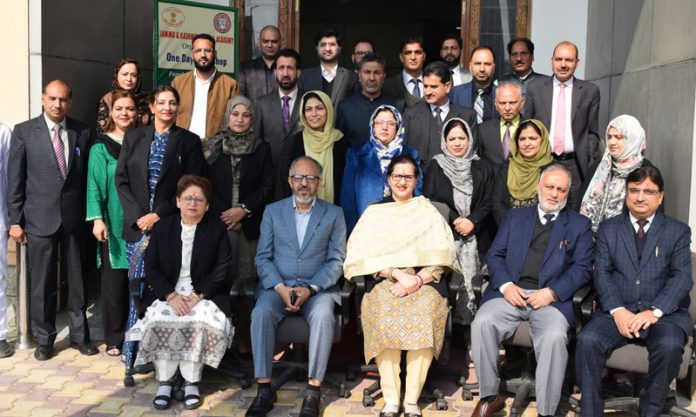
Excelsior Correspondent
SRINAGAR, Oct 26: Jammu and Kashmir Judicial Academy today organised one day workshop on ‘‘Family Court Matters and Special Marriage Act including Protection of Women from Domestic Violence Act, 2005.”
With the approval and guidance of Chief Justice High Court of Jammu & Kashmir & Ladakh (Patron in Chief J&K Judicial Academy), Tashi Rabstan and assistance from Chairperson Governing Committee for J&K Judicial Academy and members of Governing Committee, the J&K Judicial Academy organised this workshop for the judges of district judiciary of Kashmir province at J&K Judicial Academy, Mominabad Srinagar.
The programme was inaugurated by Justice Sindhu Sharma, Chairperson Governing Committee for J&K Judicial Academy, in presence of Justice Rahul Bharti, member Governing Committee for J&K Judicial Academy.
M.Y Akhoon, former District & Sessions Judge and Rajinder Saproo, Registrar Rules were the Resource Person during the workshop.
In her inaugural address, Justice Sindhu Sharma emphasised and deliberated upon the need for organising such workshops. She highlighted the importance of the family court matters, Special Marriage Act & Protection of Women from Domestic Violence Act 2005.
She highlighted that the role of a judge while dealing with the family matters is not only important but also crucial. This is because Judge has to balance the law with compassion and with the rights of the parties and in balancing all these they look not only into the provision but also the human angle to it, she added.
Justice Sindhu Sharma emphasised the restitution of conjugal rights. She said the most difficult act which not in terms of the act but in terms of enforcement and dispensation of justice is “The Guardian and Wards Act” because the children are involved and every person and every individual who has to deal with the child has to look into the welfare of the child.Welfare of the child being paramount is the only consideration while considering the guardian and wards act, resolution of its disputes and the most important and difficult part is execution of the order.
Justice Rahul Bharti, in his special remarks, said that family court matters hold a significant place they involve not just the interpretation of laws but the understanding of emotions and societal values that govern families.The dissolution of marriages, restitution of conjugal rights and issues relating to guardianship are not just legal concepts but also deeply personal conflicts that demand a nuanced approach from the judiciary.
Director Judicial Academy, Sonia Gupta welcomed all the dignitaries, resource persons and judicial officers and delivered the introductory remarks
The first session was led by Recourse Person M.Y Akhoon who focussed on family court matters, covering the dissolution of marriage, restitution of conjugal rights and the Guardian and Wards Act. He said family disputes often involve delicate emotions and in resolving these issues it requires to maintain a balance between empathy and the strict application of the law. The Family Courts Act of 1984 allows Government to establish family courts in areas with a population of over one million. He also discussed about the special marriage act which provides for a civil marriage that would enable individuals to get married outside of their respective community.
The second session was led by Resource Person, Rajinder Saproo, who discussed the Protection of Women from Domestic Violence Act 2005. He said domestic violence is a pervasive issue in society and the law provides robust protection for women facing abuse. He covered the legal framework under the act including the role of various stakeholders in the resolution of family disputes and domestic violence cases. He provided practical guidance on resolving cases involving domestic violence and ensuring the protection of vulnerable parties.

